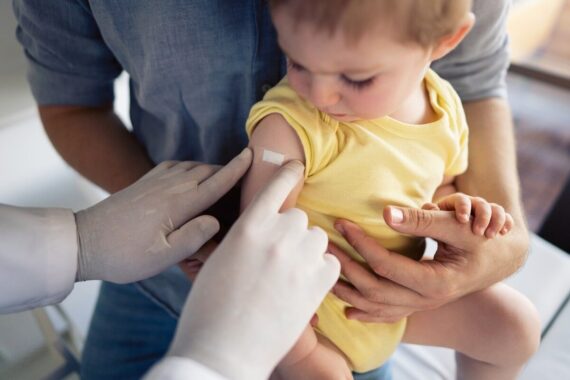UKHSA ‘seriously concerned’ amid further decline in childhood vaccines uptake

The UK Health Security Agency (UKHSA) has said it is seriously concerned about an ongoing downward trend in uptake of childhood vaccines.
Annual figures from 2022/23 show falling uptake of between 0.1 and 1.2 percentage points across 12 of 14 measures.
And no vaccines met the World Health Organisation (WHO) 95% uptake target, the figures for England show.
It comes after the most recent figures from April to June this year show further falls in the UK for the ‘6-in-1’ vaccine, rotavirus and meningitis B by one year old.
But country specific analysis shows England is faring worse than Scotland and Wales who both hit WHO targets for both the ‘6-in-1’ and first MMR dose at five years.
By contrast, MMR levels for the first and second doses by five years in England fell to the lowest rates since 2010/11, the annual figures also showed.
Dr Gayatri Amirthalingam, Consultant Medical Epidemiologist at UKHSA, said: ‘The continuing downward trend for the uptake of routine childhood vaccinations is a serious concern.
‘The diseases that these vaccines protect against, such as measles, polio and meningitis can be life-changing and even deadly.’
The British Society for Immunology called on the Government to publish its ‘long-awaited’ vaccine strategy in light of the worrying trends.
Chief executive Dr Doug Brown said: ‘England continues to miss key targets on uptake for vaccinations for children and no routine vaccination reaches the World Health Organization’s (WHO) coverage target of 95% uptake at the correct time point.’
He added it was ‘particularly worrying’ that only 84.5% of children receive the second MMR vaccine dose by age five.
MMR catch-up campaigns and publicity drives have been in place to try and boost uptake amidst rising cases of measles.
A comprehensive strategy is needed to ‘strengthen the roles of local immunisation co-ordinators, ensure services are accessible, widen community outreach and increase both investment in public health campaigns as well as engagement with parents to answer their questions on vaccines,’ he added.
Professor Azeem Majeed, a GP in South London and professor of primary care and public health at Imperial College London, said the downward trend was particularly marked in the capital.
‘The decline is of public health significance as some areas such as London are at risk of outbreaks of measles.
‘In terms of what general practice teams can do, it’s important they monitor uptake in their patients and are pro-active in identifying and contacting families where children are unvaccinated using a range of methods – such as letters, telephone, text messages and email.’
He added: ‘The government, NHS England and public health departments in local authorities also have important roles – for example, in promoting public awareness and working with local communities to address vaccine hesitancy.’
Last year, Pulse revealed that GP practices were set to lose tens of thousands in income from childhood vaccination QOF indicators due to stricter targets.
Pulse October survey
Take our July 2025 survey to potentially win £1.000 worth of tokens

Visit Pulse Reference for details on 140 symptoms, including easily searchable symptoms and categories, offering you a free platform to check symptoms and receive potential diagnoses during consultations.
Related Articles
READERS' COMMENTS [5]
Please note, only GPs are permitted to add comments to articles











I wrote some guidance on flu vaccination for my practice team that would be applicable to other vaccine programmes as well.
https://medical-centre.blogspot.com/2023/09/optimising-flu-vaccine-uptake-guide-for.html
UKHSA responsible for this, through mishandling of other vaccine programmes recently, and people now thinking if they are to be subjected to repeated episodes of covid causing illness, death and disability, why bother with protection against other lesser illnesses anyway?
Totally predictable.
The geniuses who put childhood imms into QOF a few years ago stipulated NO exception reporting.
This has backfired spectacularly.
One or two refuseniks and you cannot hit top target, so where is the incentive to keep hounding and hassling tardy parents?
Many surgeries will devote their time and effort to achievable goals instead.
And there are far more refuseniks now after the whole “Covid for kids” vaccine debacle.
If you try to force parents to accept a vaccine that their children don’t need, then don’t be surprised later when they refuse vaccines they really do need.
I agree with two previous comments, falling rates of vaccines that do work well is predictable, and is solely due to the virtual uselessness of Covid Vaccines and the vaccination programs. Parents are not stupid, they can see how ineffective Covid vaccines have been, and have knowledge of so many people that have adverse effects from the vaccine, which we as GPs are ‘silenced to say anything about’. Why can’t there be more openness and honesty from officials about the failure of Covid vaccines ?
David Banner beat me to it. You unrealistic and unachievable targets, GPS move onto something they can actually achieve and stop spending any time where they will be paid nothing despite trying their best.